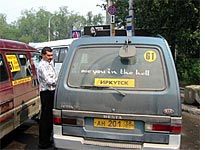Siberia: The Exile Trail
Today's slide show: Image from Irkutsk.

On the train, George Aseev had warned me about Russian planes. "My wife flies; I don't," he'd said. "She is a brave woman."
Contrary to my expectations, the Samara Airlines flight to Irkutsk was perfectly ordinary, except for the guy behind me chatting on his cell phone as we came in to land. We touched down at the stroke of 2:10 p.m., as scheduled, and the pilot immediately slammed on the brakes. When we turned onto the taxi ramp, I saw workers busily re-paving the rest of the runway.
My real brush with death came on the way into town, via the collective taxi vans known as "marshrutka." There are hundreds of these little vans in Irkutsk, following a byzantine array of numbered routes. If you know the system, you can get anywhere in town for 8 rubles (25 cents). If not, don't even try.
Most marshrutka have about a dozen seats, but they rarely carry fewer than 13 passengers. They're tremendously efficient, and they're endowed with certain special rights. For example, when traffic is backed up, marshrutka are allowed to use a special high-speed lane, which in most other places is known as "the oncoming lane." They are also permitted to pass on sidewalks and to catch air on speed bumps. For some perverse reason, the most coveted seats are up front with the driver. It's important to bang the door closed as hard as possible and never under any circumstances to open the window.
Irkutsk is the capital of eastern Siberia, and the opposite of Novosibirsk in every way. Founded in 1651 as a fortress for Cossack conquistadorskis, Irkutsk still feels like a rugged frontier outpost, the city center a jumble of pre-Soviet log and brick buildings, arrayed in what Jules Verne described as "a picturesque disorder."
Irkutsk was the destination of Russia's first celebrated group of exiles, the Decembrists, a group of 11 men banished for plotting against the czar around 1825. Their wives and girlfriends came along, and they helped make Irkutsk a relatively enlightened burg—by Siberian standards. By the late 19th century, Siberia's forests and mines had fostered a wilderness aristocracy, whose mansions still dot the downtown, since the Soviets forgot to tear them down. Early travelers on the Trans-Sib marveled at the women's grasp of the latest Paris fashions. Standards have slipped a bit, but local women still negotiate the muddy sidewalks and planks-over-puddles in high heels.
This city should be a renovators' paradise, with its classic Siberian architecture, but most of the population lives in the massive concrete apartment blocks that encircle the city, like modern ramparts. They're hideously ugly on the outside, but they do have plumbing and roofing. Russians regard them as a necessary evil, and they're the subject of satirical films, but they're also a symptom of a serious economic problem for ordinary Russians.
Actually, two problems. First, most of the local wealth flows straight to Moscow and its huge enterprises. Second, the route to home ownership, the key to American middle-class prosperity, is still a rocky, muddy one, as full of potholes as an Irkutskian street. There are no mortgages as we know them; credit is incredibly difficult to obtain. So you pay cash, all at once, or you stay in the apartment blocks, with children often living at home into their 30s.
For the first time, I get to see the inside of one of these places, and it looks a lot better inside than out. To get there, you climb up a hill via a muddy path (or, if you prefer, broken concrete steps), then go through the battered, unlocked metal door, which leads to a concrete stairwell. After the second row of mailboxes, unlock the heavily bolted door on the left. The flat belongs to my interpreter and marshrutka expert, Alexander Nevsorov, a local university student. He shares the cozy, three-room flat with his mother Anna, his stepfather, and his younger brother, Alexey, a devotee of Eminem and the Grand Theft Auto: Vice City video game.
For a few hours, I keep thinking there must be another room, but the extra door turns out to lead to a closet. The whole place can't be more than 400 square feet. The washing machine takes up most of the bathroom; incredibly, there is no dryer. It seems odd to be so cooped up in the middle of endless forests. But there are cozy couches, a cat named Sima, sausages on the stove, and real warmth inside. In short, it's home.